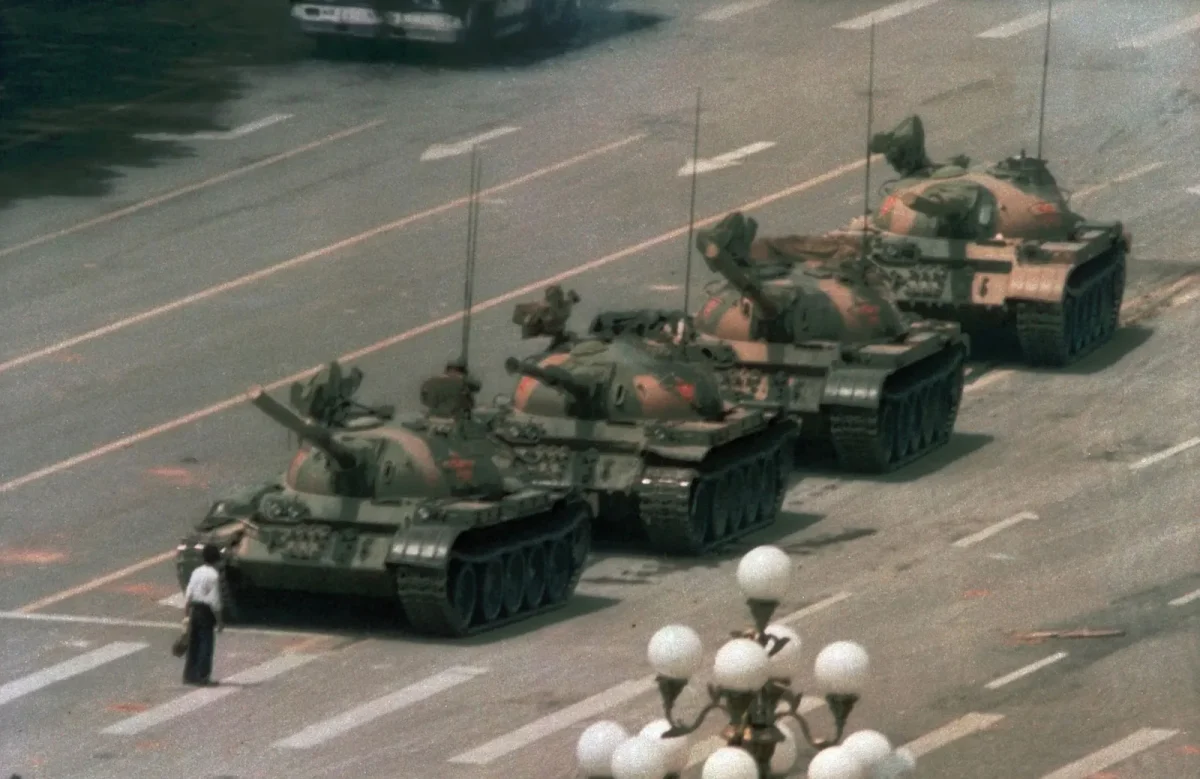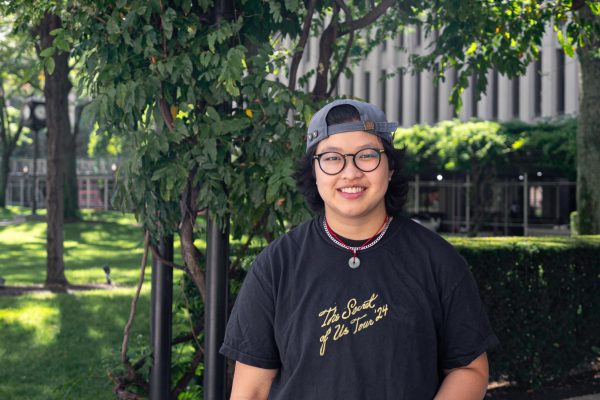An unknown man halted 18 military tanks exiting Tiananmen Square in Beijing on June 5, 1989. For three minutes, amid the noises of gunfire and distressed civilians, he stopped a convoy all on his own.
The image of the encounter immortalized the man and earned him the moniker “Tank Man.” The story behind it, however, covered extensively by the CBS Evening News team, faced censorship from the Chinese government in 1989 and erasure from history in today’s China.
As many major news outlets face pressure from the current American presidential administration and civil assembly in the form of “No Kings” protests erupt around the nation, “Tiananmen Tonight,” a documentary detailing CBS’s coverage of the Tiananmen uprising of 1989, promotes a larger discussion about government interference today.
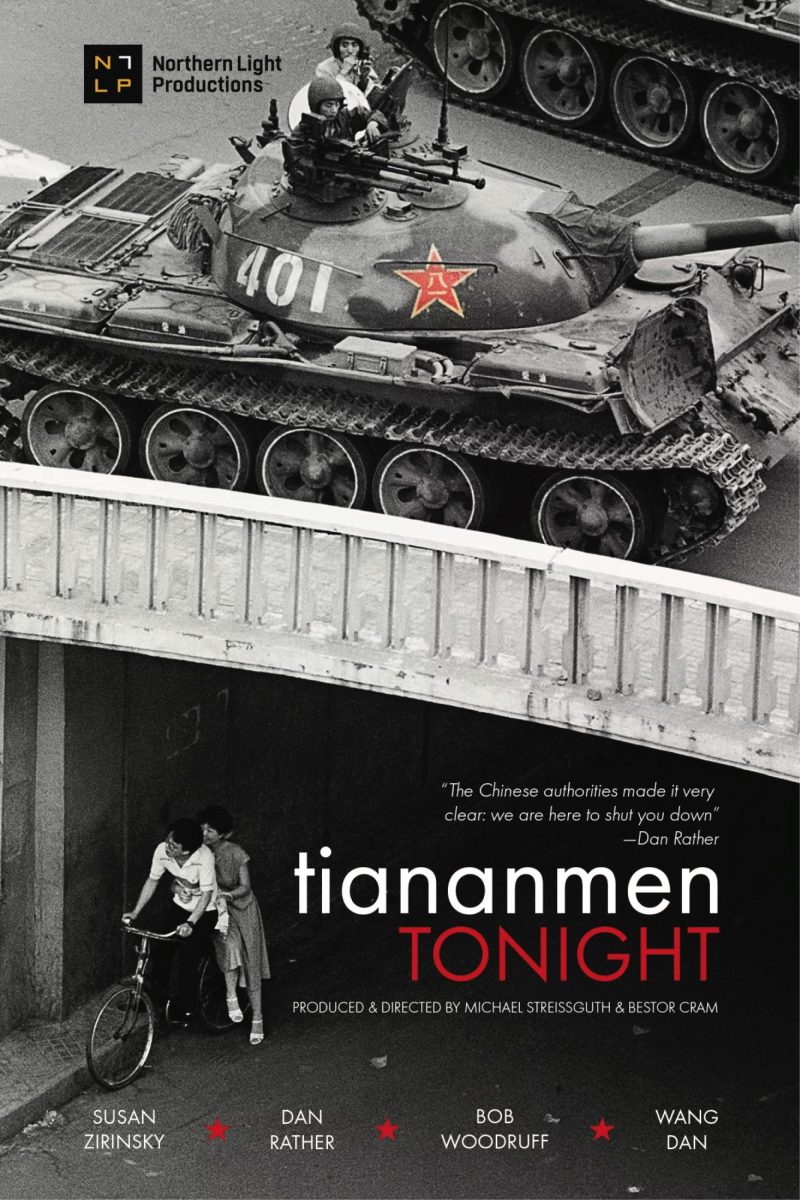
On June 4, 1989, approximately 2,600 Chinese students were massacred by their own government in and around Tiananmen Square in Beijing, China, while protesting in pursuit of freedom and democracy. Journalists from CBS Evening News were there to bear witness.
For over 50 days, CBS Evening News took to the streets of Beijing to report on the demonstrations that culminated in the massive death toll. From April 15, 1989, through the early morning of June 4, students protested tirelessly against the centralized power of their government, looking to America’s democracy as a symbol of hope.
The media presence at the square amplified the students’ voices internationally.
Chinese activist Wang Dan, interviewed in the documentary, was one of the most prominent student figures during the protests at the square.
“Gradually, there were more and more reporters,” Wang said. “I think, ‘That’s kind of an encouragement … we have to try to express clearly.’”
“CBS was able to inform its viewers of a very impactful story … much more effectively than its competition.” Michael Streissguth, director of ‘Tiananmen Tonight’
Michael Streissguth and Bestor Cram recognized the impact of the courageous coverage CBS delivered and co-directed the film.
“CBS was able to inform its viewers of a very impactful story … much more effectively than its competition,” Streissguth said. “It was a special moment in the history of CBS News.”
Fordham Lincoln Center hosted the New York premiere of the film in the McNally Amphitheatre on Oct. 16 in collaboration with the New York Press Club. Fordham students and individuals associated with CBS were in attendance.
The documentary featured archival footage from Beijing in 1989 and interviews with the main players present during the coverage of the square. Six of them sat on a panel after the screening: Linda Mason, Suzanne Allen, Peter Schweitzer, Susan Zirinsky, Bob Woodruff and Tom Bettag.
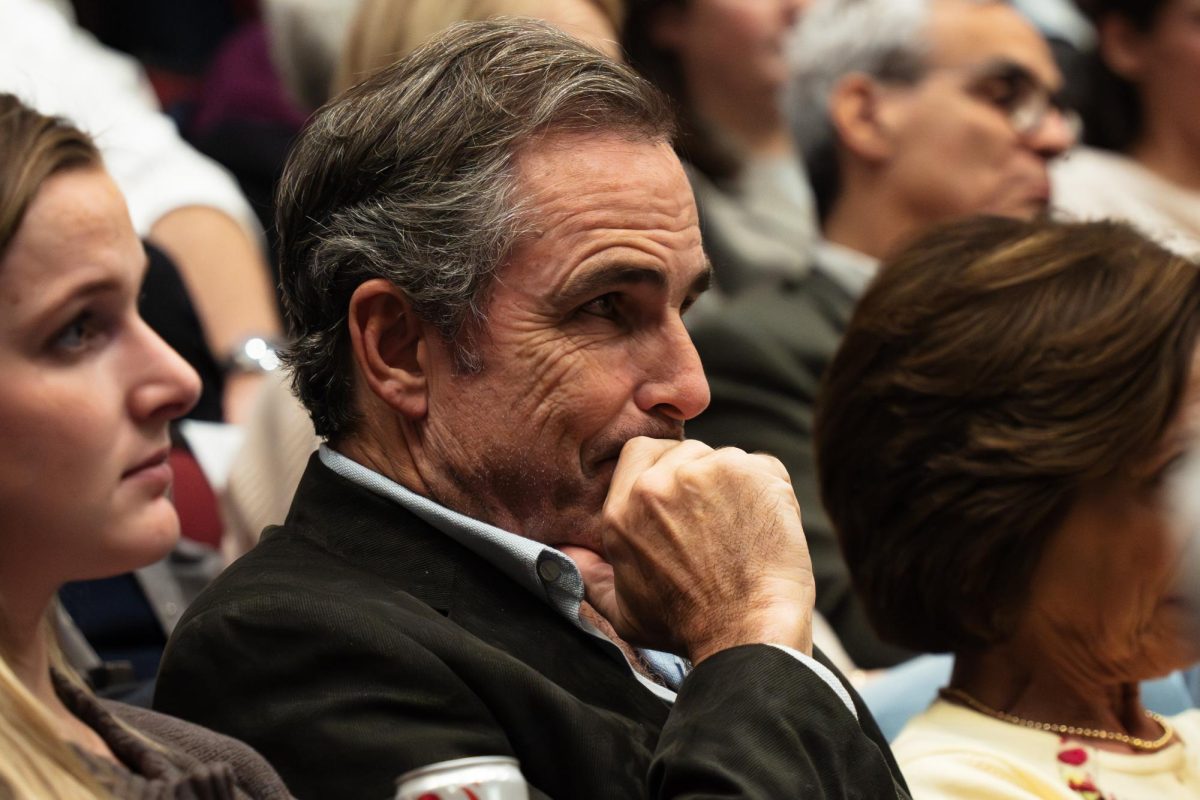
The panelists shared their firsthand accounts of how the Tiananmen coverage forever impacted their careers. According to Streissguth, Woodruff’s journalism career was born at Tiananmen Square. He had arrived in Beijing as a young lawyer to teach at a local law school. Woodruff ended up aiding the CBS Evening News team in translating Chinese and provided a voice to the student protesters, some of whom he had in his classroom.
“When my students started protesting and not going to class anymore, I approached Susan Zirinsky, who was running the entire coverage for CBS,” Woodruff said. “And that completely changed the direction of my life.”
Zirinsky was appointed the first woman president of CBS News in 2019.
Seeing the panelists’ reunion at the screening, it was clear to the audience how the Tiananmen coverage forever bonded them as colleagues in journalism and, more importantly, as friends.
“I think what makes the film special is it’s something that happened 36 years ago that is so relevant today. That this is happening when CBS is going through what it’s going through now.” Tom Bettag
Streissguth spoke to the relevance of the film not just for CBS News but for journalism as a whole.
“The coverage of Tiananmen was not only a point of pride for CBSers who worked the story, but also a page in CBS News tradition, not unlike the selling of the Pentagon or Harvest of Shame,” Streissguth said. “That kind of moment.”
Streissguth was an intern at CBS Evening News in 1989. In 2014, he wrote a story for The Washington Post to commemorate the 25th anniversary of the uprising, titled “How CBS Scooped the World on the Tiananmen Square Story.”
Cram is a career filmmaker and collaborated with Streissguth once before on the documentary “Johnny Cash at Folsom Prison.” According to Streissguth, a theme of Cram’s work follows the guiding adage that “we don’t always know what we think we know.”
Cram echoed this theme in his explanation of why he wanted to direct “Tiananmen Tonight.”
“It was a recognition that we shared interest in understanding what was happening in terms of the world of journalism, as well as wanting to find ways in which to think about how the past is the present and shapes the way in which we think about our future,” Cram said.
In 1989, CBS News faced decreased ratings due to competition with rival news agencies such as ABC and NBC. A new CEO, Larry Tisch, was appointed in 1986 and began conducting mass budget cuts and layoffs in the news department.
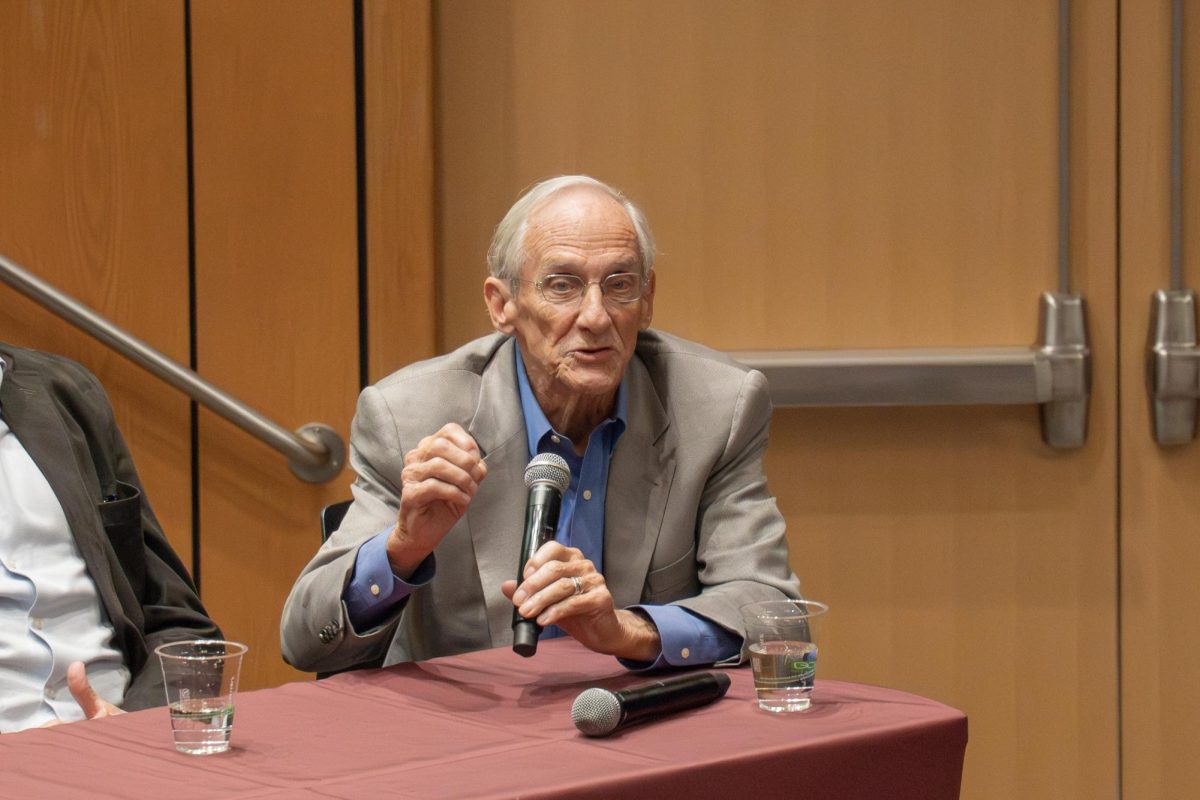
Bettag, former executive producer of CBS Evening News, began his tenure with the evening news around the same time as Tisch was made CEO.
“Larry Tisch came in as one of the first corporate buyers who was buying it for the money and as a pawn,” Bettag said. “Tisch actually said during a group meeting, ‘There are two words that I don’t ever want to hear said here, because it is always used to be an obstructionist, and that is quality and morale.’”
The profit-centric ownership of the late 1980s is not unlike CBS’s new corporate owners today, the Ellison family of Paramount Skydance. Bettag drew the comparison between the CBS he worked at and the state of the company’s leadership now.
“I think what makes the film special is it’s something that happened 36 years ago that is so relevant today. That this is happening when CBS is going through what it’s going through now,” he said. “It is fiscally repeating itself.”
In a company-wide letter, David Ellison, Paramount Skydance Chairman and CEO, announced that the company — which owns CBS — would seek to cut $2 billion in costs; layoffs are anticipated to begin Oct. 27. This comes after Skydance merged with Paramount Global on Aug. 7.
CBS News also welcomed a new Editor-in-Chief, Bari Weiss. She was appointed following Paramount Skydance’s purchase of Weiss’s company, “The Free Press,” a news site known for scrutinizing mainstream media and left-leaning “woke” culture, for $150 million. Dan Rather, former managing editor of CBS Evening News and a main character in the documentary, referred to Weiss in a Substack post as “one of the most polarizing figures in today’s American media landscape.”
Weiss was an op-ed editor at the New York Times before she left the organization and founded “The Free Press.” In her resignation letter, Weiss accused her colleagues of harassment and described the environment as hostile and illiberal. Ahead of entering the CBS newsroom, Weiss had no experience in TV broadcast journalism.
The leadership change follows CBS’s previous owner settling a lawsuit with a $16 million payment to President Donald Trump. He brought the lawsuit against the network over a “60 Minutes” interview with former Vice President Kamala Harris. The President claimed the interview was deceptively edited to favor the Democratic Party.
Also following scrutiny from Homeland Security Secretary Kristi Noem, the network has agreed to release full, unedited interviews on “Face the Nation.” Consequently, “60 Minutes” Executive Producer Bill Owens resigned, stating it had become clear he will be unable to make independent journalistic decisions for the program.
“(The film) is timely in the sense that we’re seeing mainstream media taking it on the chin from our president,” Streissguth said. “All eyes are on CBS News, ABC and NBC to see how it will continue to report and do its work. A film like this can promote discussion about that.”
“It’s timely to talk about how journalism creates the food that feeds democracy and fights authoritarianism.” Beth Knobel, professor of Journalism at Fordham
Schweitzer, senior producer at CBS News, is not pessimistic about the obstacles journalism faces in America.
“The challenges are bigger than they’ve been in the past, but we have a saying: ‘No is just the beginning of the conversation,’” he said.
CBS News reporters ended their nearly 60-year stint in the Pentagon, alongside reporters from dozens of other networks, on Oct. 17. “The journalists exited rather than agree to a 21-page list of new restrictions which would prevent them from soliciting information that has not been preapproved by the government,” CBS News journalist Margaret Brennan reported on “Face the Nation.”
Mainstream media has faced drastic changes in the wake of Trump’s second term, which may compel reporters to adapt their practices to continue to pursue truthful journalism.
Beth Knobel was also interviewed for the film. She is currently a professor of journalism at Fordham and, before she began her tenure, worked at CBS News for nine years. She suggested hosting the premiere at Fordham because of its proximity to CBS Broadcasting Center.
“It’s timely to talk about how journalism creates the food that feeds democracy and fights authoritarianism,” Knobel said.
“What journalism is at its base is a witness to history.” Tom Bettag
In 1989 and today, China is a one-party state headed by the Chinese Communist Party (CCP) and run under a centralized system of control. Speech and assembly are strictly limited through online censorship, which prohibits sensitive subject matters including any mention of the Tiananmen uprising.
“CBS News had followed what it called the changing face of communism through Poland, USSR, Cuba and other countries,” Streissguth said. “CBS had followed the change in the communist world right to the doorstep of the Tiananmen Square uprising and its viewers were the beneficiaries.”
Rather and the CBS Evening News team knew they needed to heighten their foreign coverage in order to be contenders for first place in the race against their competitors, ABC and NBC. They went to Tokyo for the farewell of the Japanese emperor. President George H. W. Bush attended and announced, while in Tokyo, that he would spend a weekend in China. So, CBS took the evening news to China while their competitors returned to America.
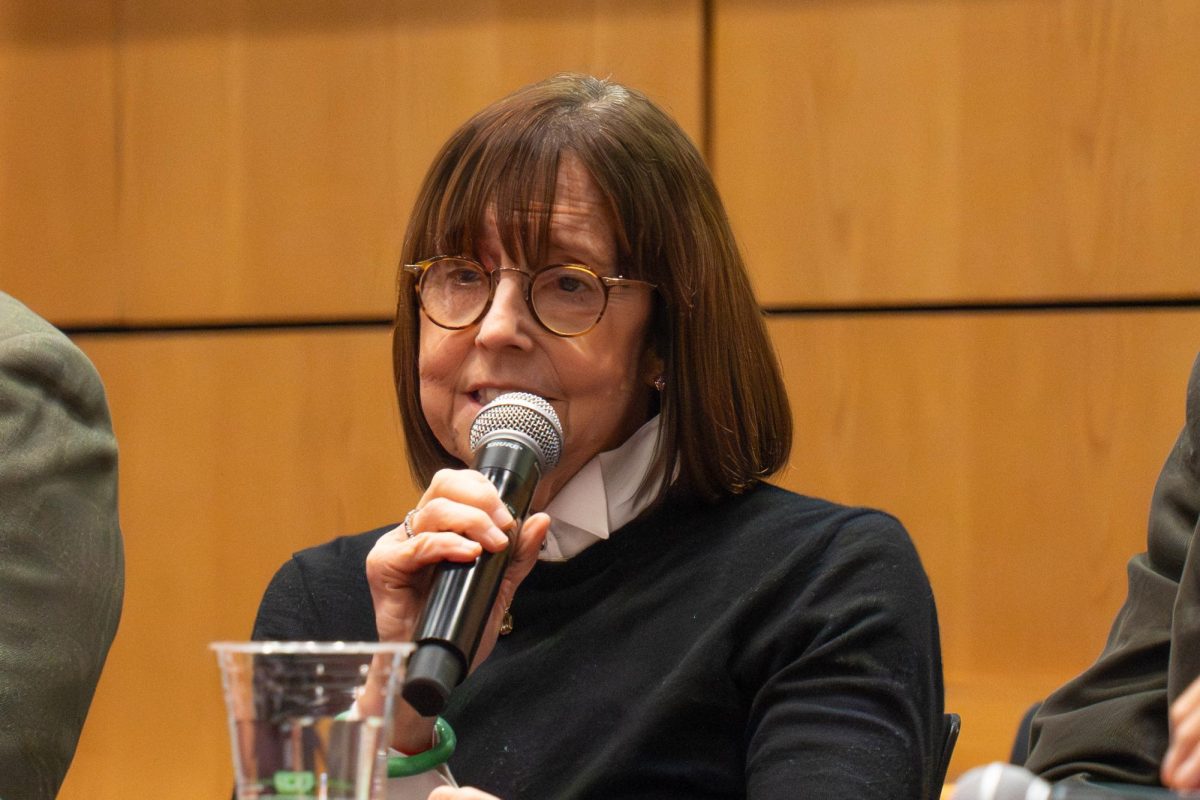
(GRACE SANTOLI)
The team’s time in China proved productive. Zirinsky heard about Purple Bamboo Park in Beijing, where people gathered to talk politics on Sundays. On air, Rather painted the picture of the dramatically changing attitude concerning the government in China through speaking with individuals in Purple Bamboo Park face-to-face.
“It was a revolution,” Rather said. “We came back from the experience saying there’s something going on here … given the context of what we thought we knew about China, we wouldn’t have thought any of that would be possible.”
They discovered themes of distress among students towards the government and knew a story was brewing.
“What journalism is at its base is a witness to history,” Bettag said. “And this was huge.”
The Tiananmen Square uprising began after the death of Hu Yaobang, former secretary of the CCP, on April 15, 1989, and culminated on June 4, 1989, with bloodshed.
Hu Yaobang encouraged democratic reform in China and was transformed into a martyr for the cause of political liberation. In the following weeks, large crowds of students and other individuals gathered in Tiananmen Square seeking political reform and democracy. About 3,500 individuals protested in the form of a week-long hunger strike, vowing that death was a consequence they were willing to face in the name of the cause they were fighting for.
Rather was there, reporting live with just a microphone and a camera-person. He spoke with the students. He listened to them intensely with his face mere inches from theirs as they wept for their country, which showed no sign of remorse as the students starved themselves.
Army troops were deployed and helicopters flew overhead. Protesters persisted in their demonstrations. In the middle of the square, demonstrators crafted a look-alike of the Statue of Liberty out of gauze and called her the “goddess of democracy.” She stood as a symbol of motivation for their cause.
“I think the students could see that they couldn’t just believe everything that the government told them,” Woodruff said. “ And they’re, for the first time, being able to express that. And I think they could see some hope from the outside.”
“You saw the humanity rise up, and then you saw them squashed.” Susan Zirinsky
Mikhail Gorbachev, then-president of the Soviet Union, arrived in China approximately a month after Hu Yaobang’s death, adding more fuel to the demonstrations. The Chinese government did what it could to shield Gorbachev from them. It was the first formal meeting between the two countries in 30 years.
Following Gorbachev’s visit and the increase in the size of demonstrations, the government began to crackdown on CBS coverage. Government officials came to the hotel where the CBS Evening News team had set up camp, threatening to cut their satellite off. Rather reported up until the very last moment, when the connection was cut and the TV turned to hash.
Shortly thereafter, Rather returned home to New York, but the reporting did not stop. Many journalists remained in Beijing to follow the story to its end.
The events culminated on the night of June 3 and early morning of June 4. Statesman Deng Xiaoping led the charge for a forceful crackdown, ordering the Chinese government to retaliate with military force and declaring martial law.
“You saw the humanity rise up, and then you saw them squashed,” Zirinsky said.
Thousands of army troops were stationed around Beijing on foot and in military tanks and, on the night of June 3, began to open fire and crush citizens at Tiananmen Square who stood in their way. On June 4, the Chinese Red Cross reported approximately 2,600 Chinese civilians dead. The government had reestablished control of Tiananmen Square.
“The next morning in my university, where I had taught for that whole year, we found four big blocks of ice with dead bodies at the top of (them) with blood coming out of their heads,” Woodruff said.
Award-winning journalist Richard Roth reported from the scenes of the massacre over the phone. His call was broadcast internationally, and millions around the world were listening when the phone line went dark after the sound of gunfire and Roth’s struggle.
“I thought I had just heard the sound of my friend getting shot in Tiananmen Square,” Schweitzer said.
Fortunately, Roth came out unharmed. He had been roughed up and arrested by Chinese officials, and subsequently released 20 hours later. Upon his return to New York, Streissguth, an intern in the CBS newsroom, recalls his welcome home like a hero coming back from battle.
“The staff just engulfed him, and that moment really embodied how much that coverage — how much that effort, that victory, in some ways — meant to that organization … almost like a family coming together,” he said.
The network returned to the number one spot in ratings after Tiananmen.
“The press sadly is under attack today and documentaries like this one that show the power of journalism, that show the power of having people whose only agenda is finding out the truth and sharing it with their audience is extremely powerful.” Beth Knobel, professor of Journalism at Fordham
In China today, the uprising has been reduced to a mere incident and faces erasure by the government. The memory of the courageous Chinese students, however, carry on in the history of American journalism thanks to the CBS reporters who bore witness at Tiananmen Square.
As the Trump administration continues to crackdown on mainstream media, pursuit of the truth within journalism is vital to maintaining a strong democracy.
“The press sadly is under attack today and documentaries like this one that show the power of journalism, that show the power of having people whose only agenda is finding out the truth and sharing it with their audience is extremely powerful,” Knobel said.
“Tiananmen Tonight” is set to premiere later this year.

